What Are the Different Types of Commercial Soup Kettles Available, and Which Is Best Suited for High-Volume Kitchens?
Commercial soup kettles are essential for restaurants, hotels, and catering operations—they streamline soup, stew, and sauce preparation while ensuring consistent temperature and quality. The right type depends on your kitchen’s volume, workflow, and menu needs, with options ranging from compact soup warmers to industrial steam kettles. AT Cooker, a leading manufacturer of commercial cooking equipment (via range-pot-stock-pot-burner), offers a range of kettles (98L to 400L capacity) designed for diverse demands. Below, we break down each type, their strengths, and which excels in high-volume settings.
1. Steam Jacketed Kettles: Efficient for High-Volume Soup Production
Steam jacketed kettles use steam to heat the kettle’s exterior, ensuring rapid, even heat distribution—critical for boiling large batches (40–100L) of soup without hot spots. Their efficiency (90–95% for AT Cooker’s induction models) cuts cooking time by 30% compared to traditional kettles, making them ideal for high-volume kitchens like banquet halls or large restaurants.
AT Cooker’s 400L Large Range Pot (20–30KW) is a steam-based induction kettle that boils 100L of soup in 13 minutes. A hotel in Las Vegas uses this model for buffet service: “We make 500L of vegetable soup daily—this kettle cooks it in 4 batches, vs. 8 batches with our old electric kettle. It saves 2 hours of cooking time.”
2. Tilting Kettles: Easy Pouring for Large Batches
Tilting kettles feature a hinged design that lets staff pour large batches (50–200L) of soup without lifting—reducing labor and spill risk. They’re perfect for busy kitchens where speed and safety are priorities, such as catering companies or hospital cafeterias.
AT Cooker’s 30KW Commercial Tilting Boiling Pan (400L capacity) has an electric tilt mechanism and sensor controls. A catering company in Austin uses it: “We serve 300+ people at events—tilting the kettle pours soup into serving vessels in 2 minutes, vs. 10 minutes with a stationary kettle. No more strained backs or spills.”
- Capacity: 100–400L (AT Cooker models)
- Power: 20–30KW (induction, 380V/400V)
- Safety features: Anti-tip locks, overheat warning
3. Stationary Kettles: Cost-Effective for Lower-Volume Needs
Stationary kettles (fixed in place) are budget-friendly and compact, making them suitable for small to mid-sized kitchens with consistent, lower-volume soup production (10–30L daily). They lack mobility but offer reliable performance for cafes, diners, or small restaurants.
AT Cooker’s 98L single burner stock pot range (8–15KW) is a popular stationary model. A diner in Chicago uses it: “We make 20L of chili daily—this kettle is perfect. It’s cheaper than a tilting model, and we don’t need to move it.”
| Kettle Type | Capacity Range | Cooking Time (100L Soup) | Ideal Volume | AT Cooker Model Example |
|---|---|---|---|---|
| Steam Jacketed | 40–400L | 13–20 minutes | High (500+ portions/day) | 400L Large Range Pot (30KW) |
| Tilting | 50–200L | 15–25 minutes | Medium-High (200–500 portions/day) | 30KW Tilting Boiling Pan (400L) |
| Stationary | 20–100L | 25–35 minutes | Low-Medium (<200 portions/day) | 98L Single Burner Stock Pot (15KW) |
| Electric Soup Warmer | 10–50L | — (holding only) | Low (<100 portions/day) | 3KW Countertop Soup Warmer |
4. Electric Soup Warmers: For Holding, Not Initial Cooking
Electric soup warmers (also called soup warmers) maintain temperature (140–165°F) for pre-cooked soup but are not designed for initial boiling. They’re ideal for self-serve stations in cafes or convenience stores but unsuitable for high-volume cooking, as they lack power to heat large batches quickly.
AT Cooker’s 3KW countertop warmer (20L capacity) keeps soup hot for 8 hours. A convenience store in Seattle uses it: “We cook soup in a larger kettle in the morning, then transfer it to the warmer. It’s perfect for holding, but we couldn’t cook 50L in it—too slow.”
5. Gas-Fired Kettles: Quick Heat Adjustment for Fluctuating Demand
Gas-fired kettles use natural gas or propane to deliver instant heat adjustment, making them suitable for kitchens with fluctuating soup demand (e.g., busy diners with peak hours). They heat quickly but are less efficient (45% efficiency) than induction or steam kettles, leading to higher operating costs.
A diner in Miami switched from gas to AT Cooker’s induction kettle: “Gas let us adjust heat fast, but our monthly bill was $400. The induction kettle (15KW) costs $150/month and still heats quickly enough for rush hour.”
Steam Jacketed Kettle
Energy Efficiency
Best for High Volume
Tilting Kettle
Energy Efficiency
Best for Medium-High Volume
Gas-Fired Kettle
Energy Efficiency
Best for Fluctuating Demand
6. Insulated Soup Stations: Reduce Energy Use in Continuous Service
Insulated soup stations have double-walled construction that retains heat for hours, reducing energy use in kitchens with continuous service (e.g., 24-hour hospitals). AT Cooker’s insulated 196L (98L×2) station uses 10% less energy than non-insulated models. A hospital kitchen said: “We serve soup 24/7—insulation keeps it hot without constant reheating, saving $80/month.”
Best for High-Volume Kitchens: Steam Jacketed & Large-Capacity Tilting Kettles
For high-volume kitchens (500+ portions/day), steam jacketed kettles (like AT Cooker’s 400L model) are the top choice—their efficiency, speed, and large capacity minimize batches and labor. For mid-high volume (200–500 portions/day), tilting kettles balance speed and ease of use.
— John, Banquet Hall Manager (Las Vegas, NV)
Get a Commercial Soup Kettle for Your High-Volume Kitchen
Share your daily soup volume and workflow—we’ll recommend the best kettle (steam, tilting, or stationary) for your needs.



